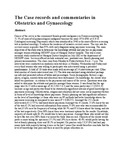| dc.contributor.author | Mwangi, George P | |
| dc.date.accessioned | 2013-04-15T07:27:31Z | |
| dc.date.issued | 2003 | |
| dc.identifier.citation | Master of Medicine in Obstetrics and Gynecology | en |
| dc.identifier.uri | http://erepository.uonbi.ac.ke:8080/xmlui/handle/123456789/15931 | |
| dc.description.abstract | Cancer of the cervix is the commonest female genital malignancy in Kenya accounting for 71.5% of cases of all gynaecological malignant tumours the years 1974-1981 at K.N.H. Cytological screening (Pap smear) which was introduced in 1940 is the most effective screening test in medical oncology. It reduces the incidence of invasive cervical cancer. The cure rate for cervical cancer is greater than 95% with early diagnosis using pap smear screening.
The main objectives of the study was to determine the knowledge attitude and practice on pap smear amongst women attending MCH/FP clinic at Maragua District hospital. This was a cross-sectional study conducted at Maragua District hospital on July 2002 at the department of MCH/FP clinic. Services offered include antenatal care, postnatal care, family planning and primary immunization. The clinic runs from Monday to Friday between 8 a.m - 5 p.m. The interviews were conducted on randomly selected days i.e Monday, Wednesday and Friday and every third woman who was willing to participate was interviewed using a precoded questionnaire. A total of 18 visits were made with an average of 14 interviews per visit. Other total number of clients interviewed was 252.The data was analysed using statistical package epi.info and presented inform of tables and percentages.
Socio-demographic factors i.e age, parity, religion, marital status and education were dertemined. On knowledge, the clients were asked ten questions - in relation to the pap smear and cancer of the cervix. Questions were also asked to determine the attitude and practice amongst these women.
It was found that the age range was 16-55 with a mean age of 26.2 (SO = 6.5) and the mean parity was 2.5 (SD=1.9). Increase in age and parity was found to be statistically significant interms of good knowledge on pap smear screening. Marital status, religion and education did not come out as important factors in terms of level of knowledge about pap smear. Family planning use had significant influence on the level of knowledge i.e those who were on FP methods had better knowledge above the pap smear screening as compared to non users (P = 0.00255).
Amongst the 252 clients interviewed,45 (17.9 %) had heard about pap smear.Amongst the 45 clients, 55.6% knew the use of the test,42.2% had received information from nurses,75.6% new who was recommended for the test,35.6% new the frequency of testing while 86.7% and 95.6 knew about the timing and site of the test respectively. Over 90% knew there were treatment options for the results. On attitude, majority of clients upto 81.3% would like to have pap smear. Amongst those who would not like to have the test, over 80% think it is meant for those who are sick. Majority of the clients would prefer a nurse taking the specimen (57.1%) and 29% by a doctor. 48.4% would prefer having the test at family planning clinic and 30.2% in hospital. On practice only 17(37.8%) had had pap smear tests with majority having it once in the last 5 years.One would therefore conclude that the level of knowledge was poor and there is need for proper education on | en |
| dc.language.iso | en | en |
| dc.publisher | University of Nairobi | en |
| dc.title | The Case records and commentaries in Obstetrics and Gynaecology | en |
| dc.type | Thesis | en |
| dc.description.department | a
Department of Psychiatry, University of Nairobi, ; bDepartment of Mental Health, School of Medicine,
Moi University, Eldoret, Kenya | |
| local.embargo.terms | 6 months | en |
| local.publisher | Department of Obstetrics and Gynaecology | en |

